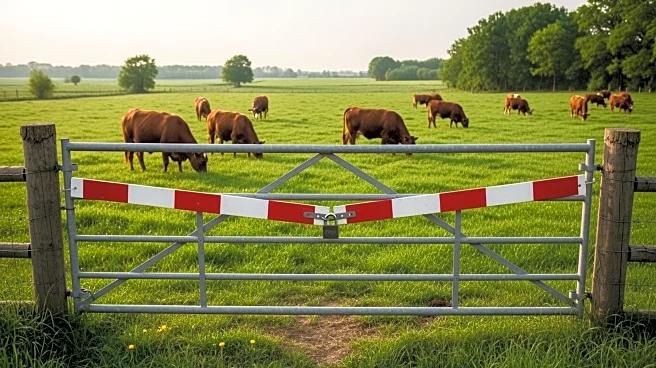What's Happening?
Mexico's Agriculture Minister Julio Berdegue is set to travel to Washington next week to negotiate the reopening of the U.S.-Mexico border for cattle imports. This move comes in response to an outbreak of the screwworm parasite, which has led to the closure
of the border since May. The screwworm, a flesh-eating pest, has been spreading northward through Central America and into Mexico, causing significant concern for livestock industries in both countries. Mexican President Claudia Sheinbaum expressed hope that Berdegue's discussions with U.S. Secretary of Agriculture Brooke Rollins will result in an agreement to reopen the border. The outbreak has strained relations between the two nations, with Rollins criticizing Mexico's handling of the situation. Mexico has reported cases of screwworm infections in Nuevo Leon, a state bordering the U.S., but claims the situation is under control.
Why It's Important?
The closure of the U.S.-Mexico border to cattle imports due to the screwworm outbreak has significant implications for the livestock industries in both countries. The U.S. is Mexico's largest trading partner, and the disruption in cattle trade affects economic relations and the supply chain. The outbreak poses a threat to livestock health, potentially leading to increased costs for farmers and impacting meat prices. Additionally, President Trump's administration is focused on lowering beef prices domestically, which includes increasing imports of Argentine beef. This strategy has angered U.S. ranchers who are concerned about competition and the impact on local cattle prices. The negotiations between Berdegue and Rollins are crucial for resolving these tensions and ensuring the stability of the livestock sector.
What's Next?
The upcoming meeting between Mexican Agriculture Minister Julio Berdegue and U.S. Secretary of Agriculture Brooke Rollins will be pivotal in determining the future of cattle trade between the two countries. If an agreement is reached, it could lead to the reopening of the border, alleviating some of the economic pressures faced by the livestock industries. However, the U.S. administration's decision to increase Argentine beef imports may continue to be a point of contention among American ranchers. Stakeholders in both countries will be closely monitoring the outcome of these discussions, as they could have lasting effects on trade relations and agricultural policies.
Beyond the Headlines
The screwworm outbreak highlights the challenges of managing cross-border agricultural pests and the importance of international cooperation in addressing such issues. The situation underscores the need for effective biosecurity measures and rapid response strategies to prevent the spread of pests that can devastate livestock industries. Additionally, the U.S. administration's approach to beef imports reflects broader economic strategies aimed at controlling food prices, which may have implications for trade policies and domestic agricultural support.















